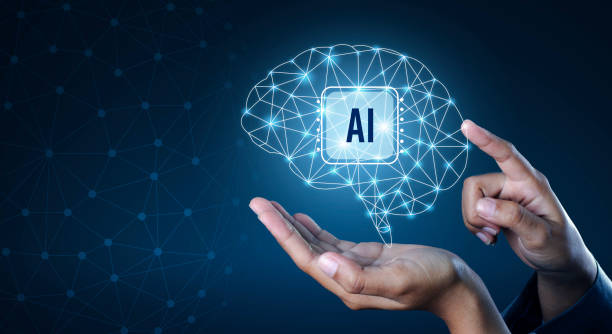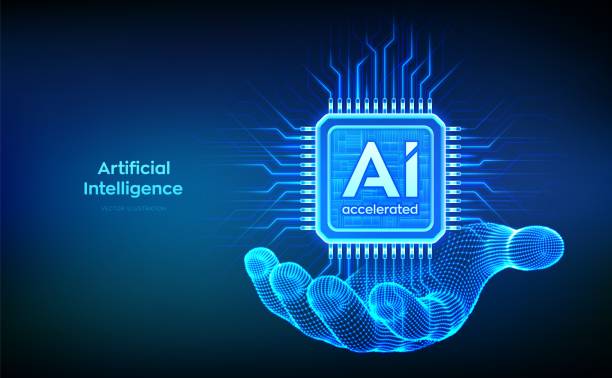What is Artificial Intelligence and How Does It Work?

What is Artificial Intelligence and How Does It Work?
#Artificial_Intelligence (AI) is a branch of computer science that seeks to create systems that can perform tasks that usually require human intelligence.
These tasks include learning, reasoning, problem-solving, understanding natural language, and pattern recognition.
Artificial intelligence is not just a technology, but a collection of approaches and techniques used to solve complex problems.
The basis of artificial intelligence is based on algorithms and mathematical models.
These algorithms allow computers to learn from data and make decisions based on it.
In short, an AI system works by receiving data, training on it, and then using the acquired knowledge to predict or make decisions.
There are different types of artificial intelligence, including:
- Narrow AI: that is designed to perform a specific task.
- General AI: that can perform any intellectual task that a human can do.
- Machine Learning: that allows systems to learn from data without explicit programming.
- Deep Learning: that uses artificial neural networks to analyze data.
Wikipedia
The applications of artificial intelligence are very broad and include fields such as medicine, industry, marketing, and transportation.
Did you know that the first impression customers have of your company is your website? With a powerful corporate website from Rasaweb, multiply the credibility of your business!
✅ Exclusive and eye-catching design tailored to your brand
✅ Improve user experience and increase customer attraction
⚡ Get free consultation!
Types of Weak and Strong Artificial Intelligence

Types of Weak and Strong Artificial Intelligence
As mentioned, artificial intelligence is divided into two main categories: Narrow AI and General AI.
Weak artificial intelligence is designed to perform a specific task and performs very well in that task.
Examples of weak artificial intelligence include facial recognition systems, virtual assistants such as Siri and Alexa, and movie and music recommendation systems.
These systems are very efficient in their specialized fields, but they cannot act beyond that.
In contrast, strong artificial intelligence aims to create systems that can perform any intellectual task that a human can do.
Strong artificial intelligence is still in the development stages, and there is no complete system that can mimic all human mental abilities.
Achieving strong artificial intelligence is one of the ambitious goals of artificial intelligence researchers.
IBM – Artificial Intelligence
The main difference between these two types of artificial intelligence is the ability to generalize knowledge and use it in new situations.
Weak artificial intelligence can only function in its specific field, while strong artificial intelligence must be able to think and learn like a human.
For example, a facial recognition system (weak artificial intelligence) can only recognize faces, but it cannot guess the person’s feelings or intentions.
In contrast, a strong artificial intelligence system must be able to do these things.
Machine Learning and Deep Learning in Artificial Intelligence

Machine Learning and Deep Learning in Artificial Intelligence
#Machine_Learning (ML) is a subset of artificial intelligence that allows systems to learn from data without explicit programming.
In fact, instead of telling the computer exactly what to do, we give it data and let it extract patterns and rules itself.
Microsoft – Machine Learning
Deep Learning (DL) is a branch of machine learning that uses artificial neural networks with multiple layers (hence “deep”) to analyze data.
These networks are inspired by how the human brain works and can identify complex patterns in data.
The main difference between machine learning and deep learning is how features are extracted from data.
In traditional machine learning, humans must identify and provide the important features to the system.
In deep learning, neural networks automatically extract features from the data.
For example, in an image recognition system, traditional machine learning may require features such as edges, corners, and colors.
In deep learning, the neural network automatically extracts these features from the pixels of the image.
Deep learning, due to its ability to process large and complex data, has achieved great success in many fields such as image recognition, natural language processing, and self-driving.
Below is a comparison table between machine learning and deep learning:
| Feature | Machine Learning | Deep Learning |
|---|---|---|
| Data Requirement | Less data | Very large data |
| Feature Extraction | Manual | Automatic |
| Complexity | Less | More |
| Training Time | Less | More |
| Applications | Wide | Image Processing, Natural Language |
Applications of Artificial Intelligence in Everyday Life

Applications of Artificial Intelligence in Everyday Life
#Artificial_Intelligence has increasingly penetrated our daily lives, often without us even realizing it.
From movie and music recommendation systems to virtual assistants and self-driving cars, artificial intelligence is changing the way we live and work.
Some common applications of artificial intelligence in everyday life include:
- Virtual Assistants: such as Siri, Alexa, and Google Assistant that can answer our questions, perform tasks, and control smart home devices.
- Recommendation Systems: such as movie recommendation systems on Netflix and product recommendation systems on Amazon that suggest new products and content based on our interests and purchase history.
- Facial Recognition: in smartphones and security systems that are used to identify people.
- Language Translation: in translation apps like Google Translate that help us communicate with people from different cultures.
- Self-Driving Cars: that are still in the development stages, but have the potential to make transportation safer and more efficient.
- Robotics: Robots are very efficient in production lines, pharmaceutical and food industries.
These are just a few examples of the applications of artificial intelligence in everyday life.
As technology advances, it is expected that the applications of artificial intelligence will become more extensive and complex.
Did you know that 94% of first impressions of a company are related to its website design?
Rasaweb helps you create the best first impression by providing professional corporate website design services.
✅ Creating a professional and reliable image of your brand
✅ Easier attraction of potential customers and improved online position
⚡ Get free corporate website design consultation
Advantages and Disadvantages of Artificial Intelligence

Advantages and Disadvantages of Artificial Intelligence
Like any other technology, #Artificial_Intelligence has both advantages and disadvantages.
The advantages of artificial intelligence include:
- Increased Efficiency: Artificial intelligence can perform tasks faster and more accurately than humans.
- Cost Reduction: Artificial intelligence can help reduce labor costs and other costs.
- Improved Decision Making: Artificial intelligence can help improve decision-making by analyzing large data.
- Creating New Opportunities: Artificial intelligence can create new opportunities for business and innovation.
The disadvantages of artificial intelligence include:
- Job Loss: Artificial intelligence can lead to job loss in some industries.
- Discrimination: Artificial intelligence algorithms can exhibit discriminatory behavior if trained on discriminatory data.
- Security Concerns: Artificial intelligence can be used for malicious purposes such as cyber attacks and automated weapons.
- Ethical Concerns: Artificial intelligence raises new ethical questions about privacy, accountability, and control.
It is important to carefully consider the advantages and disadvantages of artificial intelligence and take measures to reduce the risks and maximize its benefits.
The Future of Artificial Intelligence and Upcoming Prospects

The Future of Artificial Intelligence and Upcoming Prospects
#Artificial_Intelligence is a rapidly developing technology and is expected to play a more important role in our lives in the future.
Some of the upcoming prospects for artificial intelligence include:
- Strong Artificial Intelligence: Achieving strong artificial intelligence (AGI) that can think and learn like a human is one of the ambitious goals of artificial intelligence researchers.
- Explainable Artificial Intelligence: Creating artificial intelligence systems that can explain how they make decisions is essential for gaining trust and confidence in these systems.
- Ethical Artificial Intelligence: Developing artificial intelligence algorithms that are fair, transparent, and accountable is essential to prevent discrimination and other ethical problems.
- Integration with Other Technologies: Integrating artificial intelligence with other technologies such as the Internet of Things (IoT) and blockchain can create new opportunities for innovation.
The future of artificial intelligence is full of challenges and opportunities.
By developing and deploying this technology responsibly, we can benefit from its advantages and reduce its risks.
Ethical Challenges of Artificial Intelligence

Ethical Challenges of Artificial Intelligence
The development and expansion of #Artificial_Intelligence has created numerous ethical issues and challenges that require serious examination and attention.
These challenges include:
- Privacy: Artificial intelligence systems often require a large amount of personal data, which can lead to concerns about privacy and data misuse.
- Discrimination: Artificial intelligence algorithms can exhibit discriminatory behavior if trained on discriminatory data.
This can lead to inequality in opportunities and outcomes. - Accountability: When an artificial intelligence system makes a mistake, it is difficult to determine responsibility.
Should the developer, the user, or the artificial intelligence system itself be held responsible? - Transparency: Many artificial intelligence algorithms are complex and incomprehensible, which can lead to distrust and concern about how they make decisions.
- Control: With the advancement of artificial intelligence, there are concerns about the loss of human control over this technology.
To address these ethical challenges, there is a need to develop ethical standards, appropriate laws and regulations, as well as public education and awareness about the ethical issues of artificial intelligence.
Below is a table of different types of artificial intelligence algorithms:
| Algorithm Name | Application | Description |
|---|---|---|
| Linear Regression | Prediction | Modeling the linear relationship between variables |
| Decision Tree | Classification | Creating a decision tree for classifying data |
| Support Vector Machine | Classification | Creating an optimal decision boundary between categories |
| Neural Networks | Deep Learning | Simulating brain function to learn complex patterns |
Artificial Intelligence and Its Impact on the Labor Market

Artificial Intelligence and Its Impact on the Labor Market
#Artificial_Intelligence has a significant impact on the labor market, both through the creation of new job opportunities and through the replacement of some existing jobs.
Automation of repetitive and routine tasks by artificial intelligence systems can lead to job loss in some industries, especially jobs that require low skills.
On the other hand, artificial intelligence can create new job opportunities in areas related to the development, deployment, and maintenance of artificial intelligence systems.
Also, artificial intelligence can help improve productivity and efficiency in many industries, which can lead to economic growth and the creation of more job opportunities.
To adapt to the labor market changes caused by artificial intelligence, people need to learn new skills and develop soft skills such as problem-solving, critical thinking, and creativity.
Governments and organizations should also take measures to support affected workers and facilitate their transition to new jobs.
The impact of #Artificial_Intelligence on jobs can be both destructive and constructive.
Are you tired of your online store having visitors but no sales? Rasaweb solves your main problem with professional online store design!
✅ Significant increase in sales with targeted design
✅ Flawless user experience for your customers
⚡ Get free consultation!
Artificial Intelligence Learning Resources for Enthusiasts

Artificial Intelligence Learning Resources for Enthusiasts
If you are interested in learning more about #Artificial_Intelligence, a variety of educational and informational resources are available.
Some of these resources include:
- Online Courses: Websites such as Coursera, edX, and Udacity offer numerous online courses in artificial intelligence, machine learning, and deep learning.
- Books: There are many books on artificial intelligence and related topics that can provide in-depth knowledge in this field.
- Scientific Articles: Scientific articles published in reputable journals and conferences cover the latest advances and achievements in artificial intelligence.
- Online Forums and Groups: Participating in online forums and groups can help you connect with other artificial intelligence enthusiasts and learn from their experiences.
- Practical Projects: Undertaking practical projects in the field of artificial intelligence can help you strengthen your skills and gain a deeper understanding of this technology.
By using these resources, you can acquire the knowledge and skills necessary to enter the world of artificial intelligence and work in this emerging and opportunity-filled field.
Intel – What is Artificial Intelligence
Key Tips for Success in the Field of Artificial Intelligence

Key Tips for Success in the Field of Artificial Intelligence
To succeed in the field of #Artificial_Intelligence, it is essential to pay attention to the following tips:
- Continuous Learning: Artificial intelligence is an evolving field, so continuous learning and staying up-to-date with the latest advances is essential.
- Developing Soft Skills: Soft skills such as problem-solving, critical thinking, and creativity are essential for success in this field.
- Specialization in a Specific Field: Choosing a specific field in artificial intelligence and focusing on developing expertise in that field can help you stand out in this competitive field.
- Creating a Network: Connecting with other experts and activists in the field of artificial intelligence can help you learn from their experiences and find new job opportunities.
- Focusing on Solving Real Problems: Focusing on solving real problems and providing practical solutions using artificial intelligence can help you demonstrate your value in this field.
By following these tips, you can achieve success in the field of artificial intelligence and contribute to the advancement of this technology.
Artificial intelligence is created to help humans, not to harm them.
Frequently Asked Questions
| Question | Answer |
|---|---|
| What is Artificial Intelligence? | It is the simulation of human intelligence in machines programmed to think like humans and imitate their actions. |
| What are the main branches of Artificial Intelligence? | They include machine learning, deep learning, natural language processing, computer vision, and robotics. |
| What is Machine Learning? | It is a branch of Artificial Intelligence that focuses on enabling systems to learn from data and identify patterns without explicit programming. |
| Mention examples of Artificial Intelligence applications in our daily lives. | Voice assistants (such as Siri and Alexa), recommendation systems in Netflix and Amazon, self-driving cars, and facial recognition programs. |
| What is Deep Learning? | It is a subset of machine learning that uses multiple layers (deep) artificial neural networks to process large amounts of data. |
| What is Natural Language Processing (NLP)? | It is a branch of Artificial Intelligence that focuses on enabling computers to understand, interpret, and generate human language. |
| What are some ethical concerns related to Artificial Intelligence? | They include bias in data, privacy, job loss, and responsibility in case of errors. |
| What are the main benefits of Artificial Intelligence? | Increasing efficiency, improving decision-making, automating repetitive tasks, and discovering complex patterns in data. |
| How is Artificial Intelligence used in the field of healthcare? | In diagnosing diseases, discovering drugs, analyzing medical images, and personal care for patients. |
| How do you see the future of Artificial Intelligence? | It is expected to continue to develop at a rapid pace, affecting all aspects of human life, from industry to education and entertainment. |
And other services of Rasaweb Advertising Agency in the field of advertising
Smart Sales Automation: An exclusive service for growing digital branding based on precise audience targeting.
Smart Data Analysis: Designed for businesses looking to analyze customer behavior through Google Ads management.
Smart Direct Marketing: An exclusive service for growing campaign management based on intelligent data analysis.
Smart Advertising Campaign: Transform user interaction with the help of proprietary programming.
Smart Data Analysis: An exclusive service for growing website traffic based on marketing automation.
And over hundreds of other services in the field of internet advertising, advertising consulting and organizational solutions
Internet Advertising | Advertising Strategy | Advertorial
Sources
MIT Technology Review – Artificial Intelligence
,Google AI
,OpenAI
,IBM Artificial Intelligence
? Are you ready to take your business to the top of the digital world? Rasaweb Afarin, a leading digital marketing agency, with expertise in search engine optimization (SEO), content marketing, and responsive website design, provides innovative and comprehensive solutions for your growth and visibility. We help you achieve your business goals and outperform your competitors with a strong and impactful presence in the online space.
📍 Tehran, Mirdamad Street, next to the Central Bank, South Kazerun Alley, Ramin Alley No. 6




